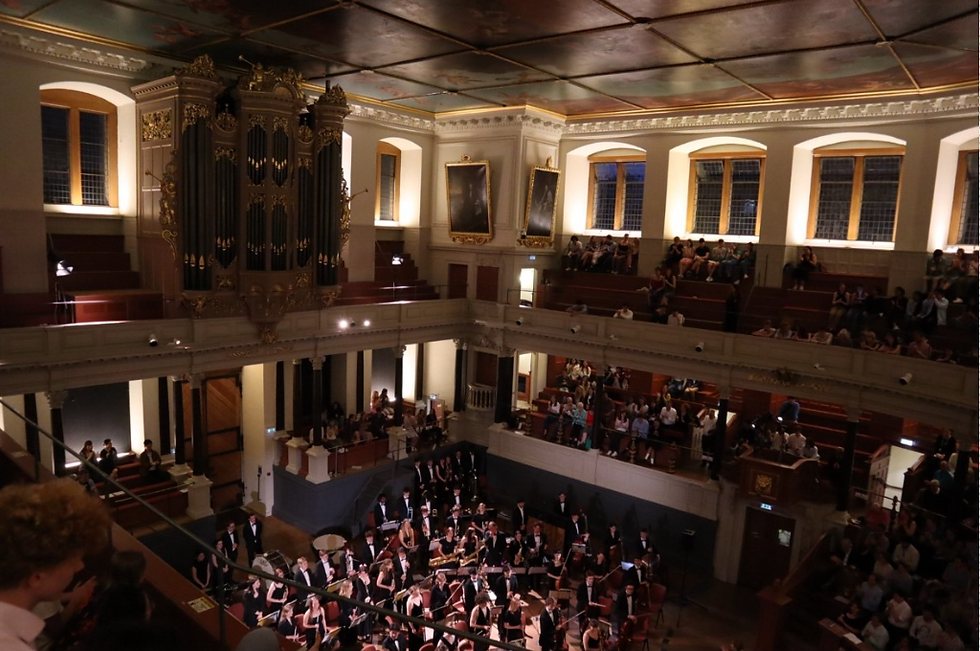REVIEW: THE RELENTLESS APPROACH OF BETTER TIMES
- Evie Brenkley

- Oct 26, 2019
- 3 min read
Claire Frampton reviews The Relentless Approach of Better Times with IF Oxford Science and Ideas Festival and Oxford Contemporary Music Boom Artist Emma Smith. 24/10/2019
The Relentless Approach of Better Times was a multimedia live performance with a film screening on a stage, featuring juxtaposed clips relating to contemporary issues, with live music from Emma Smith on the double bass. Smith also produced the film which explored “the geopolitical landscape in which we find ourselves and ways to connect and feel grounded in times of trauma, chaos and mass migration” (Performance programme notes). In three sections, the first part of the film featured footage of burning trees blended with scenes of buildings, also firearms. Smith occasionally looked at the screen while playing jazz inspired improvisation. Next to the bass a wooden bell occasionally jangled as part of the performance. In a later section, titled Social, typed words on the screen communicated information about Brexit job losses and current information about Boris Johnson’s political decisions. In the last section of the film, Smith is on the screen applying make up to her face, not taking too much care about it, smudging eye shadow and lipstick, applying a clown style mouth. A pre-recorded percussion accompaniment to the bass was introduced. After the performance Smith took questions from the audience and talked about the physicality of her relationship with her instrument. She described an experience where she had been playing music in Palestine, and was told about an artists‘ residency where she had two days to apply. She had been working with children, and spoke about music as a way of transforming playgrounds; she has played in situations where there had been shooting in that area the day before she arrived, so she played to a shocked audience. Workshops in conflicted areas involved blending of musical styles, including local folk music, producing a type of hybrid genre. Though recordings of the music were made, they would not be made available outside a conflicted area because this is not the purpose of the workshops She explained that she played with Musicians Without Borders, a charity that works in post conflict areas to build projects tailored to individual localities. Currently this charity is active in “Kosovo, Greece, Northern Ireland, Germany, Rwanda, Uganda, El Salvador, Italy and The Netherlands” (musicianswithoutborders.org), and a sister Project Sounds of Palestine.
Smith explained that she uses music as a way to deal with trauma; the act of playing music, moving and stretching helps to relax the body.
In terms of how she conceived her performance, with a bass and screen, she said that she developed her relationship with the screen and solo performance and perceived it as natural, as the event wouldn’t be the same with a recorded soundtrack. Discussing the criteria for making her film, she said that she wanted it to be about what’s happening now in politics, and after producing the film she saw information on the news she wanted to include. In the first part of the film, she included information about how the media is manipulating people’s attitude to migration. She looks at migration as a human issue, the result of climate change, and the way people are desensitised to sensitive issues. She wants to play live since she feels that live music can give depth to the way she feels about traumatic situations. The first two sections of her film were a bit tough and in the third section she looked out to the audience while playing to check that people were OK.
The performance was part of Oxford IF Science and Ideas Festival, their mission for the “complexity wonder and opportunities of scientific research to be explored, challenged and enjoyed across society” with a programme of interactive events facilitating interaction between researchers and the public (if-oxford.com). The 2019 festival featured other music events in a varied programme, such as Rhymetime: songs and rhymes for under-5s, with songs relating to science and technology, and an event Research in Harmony featuring songs rewritten by science researchers and accompanied by acappella group The Beetroots. Emma Smith is an established performer who studied classical double bass at RCM, and “forged a career as a versatile composer, improviser and collaborator” (event programme).
Claire Frampton works for Oxford University Gardens, Libraries and Museums and plays double bass in University groups such as: OUSE, OU Philharmonia, Trinity College Orchestra and Turl Street Festival Orchestra. She is enrolled on professional development certificate Associateship of the Museums Association and continues to integrate playing bass into a professional interest in music in museums.
Photo: Emma Smith, http://www.emmasmithbass.com




Comments